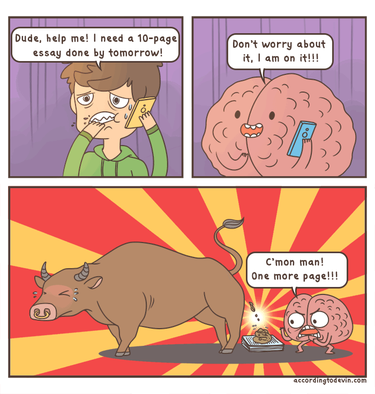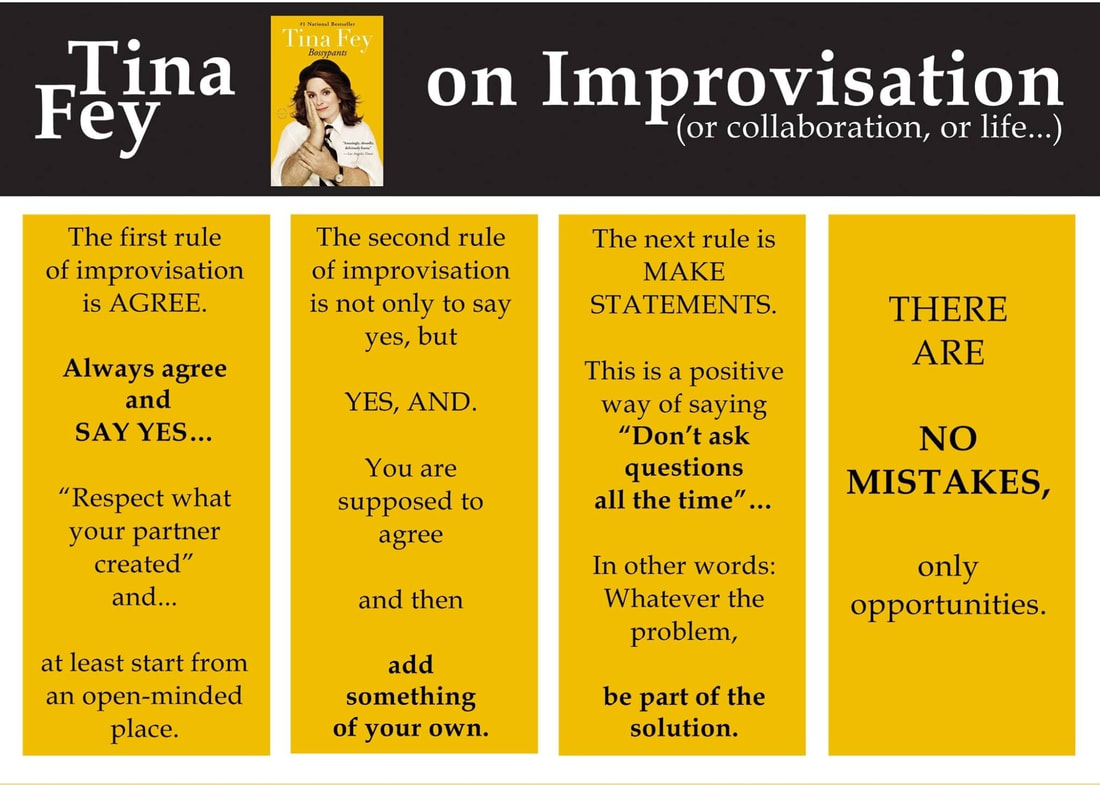 A little secret about teachers - we BS a lot, we are well practiced in it, in fact. There are generally two types of BS; the first kind is the half-hearted BS you tell yourself as an excuse not to do the dishes or mow the lawn. "There's nothing wrong with a few dirty dishes. Right now, there are more important things to do" - the means isn't really important so long as you achieve your goal. The second, more refined kind of BS is the kind that has a little more conviction behind it. It's the kind of high-tech BS machinery you never realized you possessed that only gets unleashed in the final hours before a major project, paper, or assignment is due. It is the BS that has the essence of utter crap and yet somehow manages to surpass even your highest expectations. Let's face it, there is something tasteful about BS-ing with conviction; teachers do it and improvisers do it. There's an argument to be made about stepping up our BS game as teachers and helping our students do the same, and we have a thing or two to learn from improvisational theatre. Teaching, like improvisation, is a performance art. Both have entertainment value (or the potential of, at least). Both require quick thinking and have elements of spontaneity. Both operate within a system of carefully defined "rules". Good teaching, like good improvisation, requires that students and teachers (the "players") are closely attuned. In improv, this tuning process happens early on as players establish a "base reality" for the scene - the who, what and where. Only when this base reality is set, can players begin to explore the world that they've created together. In teaching, this is analogous to establishing students' prior knowledge on a subject. The prior knowledge is the base reality in which both students and teacher can build new learning upon. Improvising is wonderful. But, the thing is that you cannot improvise unless you know exactly what you're doing - Christoper Walken Everybody can improvise and everybody can teach, but things always sound easier than they actually are. So naturally, when I found out I would be teaching drama, I underestimated how difficult it would be to do it well. I claim to be a math and science teacher, but I also dislike the whole 'I'm-not-an-English-teacher-so-it's-okay-if-I-can't -spell' type excuse. Who says a math/science teacher can't teach drama? Armed with vague memories of middle school drama, some words of advice from my colleagues, and a lot of research, I taught a group of grade eight students the basic elements of improvisational theatre. The dream: foster greater teamwork, collaboration, and creativity amongst my students. The reality: a lot of reluctance, awkward silences, and miscommunication. Students were reluctant to participate because it potentially meant making a fool of themselves in front of their classmates. There were awkward silences because they were uncomfortable with the idea that they could control the dialogue rather than do what they were told. Miscommunication happened because students focused too much on making themselves look good at the cost of sloppy scene work. Our first attempts at simple improv games failed tremendously. The foundation of trust wasn't there, and students had not yet learned the art of failing spectacularly. I challenged my students often and constantly pushed them towards more complicated tasks and scene work. What I didn't realize, however, was that my students probably needed a much gentler progression, and more scaffolding. If I were to teach improv again I would spend more time on the fundamental concepts and revisit them often. I would tell my students that you don't need to be loud to be heard, and I would focus more of my feedback on things that were going well rather than things that weren't. Even though my little experimentations with improv failed in a lot of ways, I learned much from the experience and would do it again in a heartbeat. Not only did teaching improv put me out of my comfort zone in terms of teaching, but we had a lot of fun! In the beginning I did a lot of "telling"; I read up on the rules and common pitfalls and communicated these to my students in hopes that they would avoid them. This did not work. They did those things anyway. But they got really good at doing those things, so for half a class, we just practiced doing scenarios in which your partner either blocked or wimped* in a scenario and we talked about what that felt like and how to make it better. Then we tried adhering to the "yes, and" rule and discovered that it was harder than it seems! With repeated trials and errors, we slowly progressed to a point where a few students felt comfortable performing on stage, others began to feel a little less intimidated, and everyone learned a bit about what it means to work together effectively. Teaching and learning about improvisation was like figuring out how to have a great conversation. When a scene goes poorly, it is usually because a player is too much in their own heads and not focused on their scene partner. Much like in life, this is annoying because we seldom have great conversations with people who try to make everything about themselves. As we continued to explore improv, both my students and I became more mindful of how certain responses can either help or hinder a scene. A friend of mine gave me some good improv advice, "You should always make your partner look good," which is another way of saying, "This isn't about you." For example, your scene partner makes an offer and says, "Wow, the view is amazing from here," and if you say, "What view?" then you are putting a lot of pressure on your partner to make something up to progress the scene. If instead you respond, "I have really bad vertigo, I need to get off this cliff," then you just made your partner look good by taking their offer, and adding some valuable information to it. Wouldn't it be great if all class discussions could flow so smoothly? Where all students are equal participants, building on the ideas of one another, and each adding something of value? I see value in teaching and learning improv outside the drama classroom. This article makes some good arguments for why and how improv can be incorporated into all subject matters, and has some great sample games and activities that can be modified for all grade levels. If you are a teacher who is curious about how improv can be implemented into other subjects, I highly recommend reading this paper. Below are a list of Tina Fey's four basic rules on improvisation, taken from her book Bossypants. In my next blog, I will elaborate on how I believe these rules are connected with my teaching practice. *Blocking: Rejecting information or ideas offered by another player. One of the most common problems experienced by new improvisers.
Example Player A: Look at that dog! Player B: What dog? Wimping: Accepting an offer but failing to act on it. Example Player A: We should go to the movies. Player B: Yes.
0 Comments
|
April SooInternational math educator who writes, occasionally. Archives
April 2020
Categories
All
|


 RSS Feed
RSS Feed
